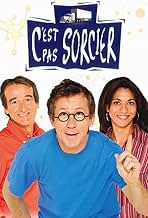Two historians go back to historic sites and explain science and history in a comedic way.Two historians go back to historic sites and explain science and history in a comedic way.Two historians go back to historic sites and explain science and history in a comedic way.
- Awards
- 1 win & 1 nomination
Browse episodes
Storyline
Did you know
- ConnectionsReferenced in Protéger & servir (2010)
Featured review
The series are known in France as spreading science to the children. But they are not very well documented. And, being the country where people consume the most homeopathy, mysticism creeps in at every corner.
For example the episode about bio agriculture. If you make a list with the information presented, yes, most of the points are there. Lower productivity, bigger problems, the necessity to employ techniques that are more complicated when compared with the rest of the agriculture. Yet you have the magic talk: conventional agriculture uses "chemical fertilizer" when the bio farmers use only compost. Right. Only that 1. there is no obligation for the conventional farm to use only artificial fertilizer. 2. Compost is "chemical". 3. Artificial fertilizer is made to mimic and improve on the compost. 4. Artificial fertilizer can be better tuned for the needs. 5. Compost is the result of the animal feed, so it can have higher levels of certain chemicals and lower levels of other substances. And the list can go on.
Besides using trap and emotional terms that are not really in the interest of propagating science, logic is certainly missing in the production. Taking the same episode as an example, bio agriculture has lower productivity, the global population increases, but we (who?) will work to have better productivity. They ignore the decrease in good agricultural land because of urban and industrial development. In Europe, agricultural land is also lost because of increasing surfaces for the natural reserves. Which is an excellent thing to do, only that it leaves less space for agriculture. If we put in global warming and the global reduction in land surface and water there are even less reasons to be optimistic.
Finally, referencing the same episode, a member of the team is moving in what is assumed to be a bio store. He talks about new products being sold like jam or wine. He means new products that receive the bio label. And finally he moves to some vegetables to say they are better for the health (?) because they contain less chemicals (all vegetables are made out of chemicals) and because they have more vitamins (?). Of course, studies to support this are few and quite far apart. But, it's for the children, right?
Contact me with Questions, Comments or Suggestions ryitfork @ bitmail.ch
For example the episode about bio agriculture. If you make a list with the information presented, yes, most of the points are there. Lower productivity, bigger problems, the necessity to employ techniques that are more complicated when compared with the rest of the agriculture. Yet you have the magic talk: conventional agriculture uses "chemical fertilizer" when the bio farmers use only compost. Right. Only that 1. there is no obligation for the conventional farm to use only artificial fertilizer. 2. Compost is "chemical". 3. Artificial fertilizer is made to mimic and improve on the compost. 4. Artificial fertilizer can be better tuned for the needs. 5. Compost is the result of the animal feed, so it can have higher levels of certain chemicals and lower levels of other substances. And the list can go on.
Besides using trap and emotional terms that are not really in the interest of propagating science, logic is certainly missing in the production. Taking the same episode as an example, bio agriculture has lower productivity, the global population increases, but we (who?) will work to have better productivity. They ignore the decrease in good agricultural land because of urban and industrial development. In Europe, agricultural land is also lost because of increasing surfaces for the natural reserves. Which is an excellent thing to do, only that it leaves less space for agriculture. If we put in global warming and the global reduction in land surface and water there are even less reasons to be optimistic.
Finally, referencing the same episode, a member of the team is moving in what is assumed to be a bio store. He talks about new products being sold like jam or wine. He means new products that receive the bio label. And finally he moves to some vegetables to say they are better for the health (?) because they contain less chemicals (all vegetables are made out of chemicals) and because they have more vitamins (?). Of course, studies to support this are few and quite far apart. But, it's for the children, right?
Contact me with Questions, Comments or Suggestions ryitfork @ bitmail.ch
Details
- Release date
- Country of origin
- Official site
- Language
- Also known as
- Nem boszorkányság
- See more company credits at IMDbPro
Contribute to this page
Suggest an edit or add missing content






